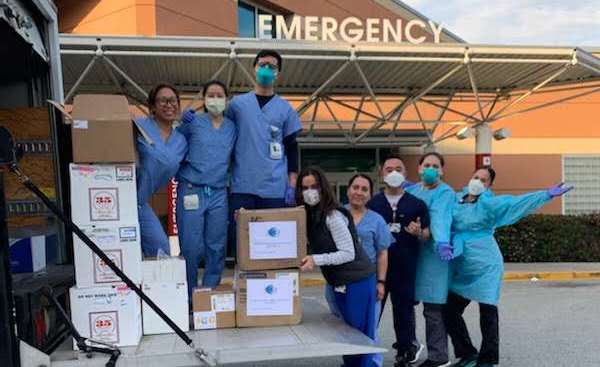On Mother’s Day, Lei Liu hauled water, flowers, and 300 lunch boxes to his local Kaiser Permanente hospital.
It wasn’t his first time there in the last couple of months. In fact, the car repair shop owner had recently visited 15 Kaiser hospitals around the Bay Area to deliver donations of over 50,000 masks and 5,000 other personal protective equipment (PPE) items.
“Hospitals are afraid to request too much,” he explained in a phone interview. “I always try my best to beat what they ask by several thousand masks.”
Like many other Chinese Americans who closely followed the outbreak that unfolded in China, Liu recognized the risks of the pandemic for the United States in its early stages. He began to fundraise through WeChat, connect with a 3M company agent in China, and ship over 100,000 masks and PPE items to local hospitals and testing centers, adding those in southern California, New York City, Boston, Seattle and Chicago as cases began to rise around the nation.
Liu is not alone in his efforts. Arming themselves with fundraisers, PPE donation drives, and the determination to support the community in a time of need, Chinese Americans across the Bay Area have mobilized through expansive and well-organized networks in response to the devastation brought on by the COVID-19 outbreak.
The projects address a sweeping range of pandemic needs and are spearheaded by all kinds of groups spanning multiple generations: local alumni associations of Chinese universities, senior mahjong groups, established church networks, and high-schooler-led nonprofits, to name a few. Through enormous WeChat networks, they pool together resources, assign project leaders, and coordinate operations with maximum efficiency. Catherine Zhang, who has been serving as the unofficial leader to help bring together various groups across the Bay Area, likened the community’s work to “ants toiling together in a colony,” creating meaningful impact from the small contributions of each member.
One such member, who wishes to remain anonymous, has taken on the pandemic relief effort as a daily commitment. From morning to night, she runs massive fundraisers and mask collections across the countless WeChat communities she takes part in as the leader of Tianmu Education Foundation. In addition to 18,000 masks, several thousand lunchboxes, and 180,000 dollars contributed, she has also played large logistical roles in countless other donation efforts by coordinating schedules and compiling resources of hospital addresses and supply needs.
Indeed, with the efforts of both the individual initiatives and the large donation projects often involving several thousand members, the Chinese American community in the Bay Area has achieved considerable impact. It has donated over 1.7 million dollars to hospitals, police departments, senior centers, homeless shelters, and local businesses. Those who have connections to manufacturers in China work tirelessly to haul over countless donations of masks and equipment, while others spur local collections of PPE and disinfectant products. Together, the community has collected over 300,000 surgical masks, 45,000 N95 masks, 7,000 protective suits and face shields, and 27,000 pairs of gloves for healthcare workers and at-risk people.
These numbers don’t include the businesses who have stepped up to shoulder the responsibility. Chinese-owned Zenni Optical has purchased over 3,000,000 masks and PPE items for medical professionals, first responders, and service workers around the country. And even as popular mobile gaming company IGG began facing increases in server traffic due to the pandemic, its CTO, Mark Zhang, has been spending much of his time allocating the over 100,000-dollar pandemic relief budget he had approved by the company. Thus far, he has delivered 25,000 FDA-approved N95 masks and PPE items to over 20 hospitals in the Bay Area, New York and Boston.
As big corporations like IGG make their contributions, so do multitudes of student-led nonprofits. The high school leaders of The Book Bank have re-purposed the organization’s media reach to collect funds for 1,500 KN95 masks and 200 face shields.
“I’m honored to contribute to a community where everyone is supporting the cause however
they can,” said Oliver Ye, a high school junior from Saratoga. He leads Silicon Valley Youth, one of Bay Area’s largest student-led nonprofits dedicated to supporting underfunded school districts. Since the wave of stay-at-home orders across the country, his team has been providing free online classes about current events, identifying misinformation in the media, and the science behind the coronavirus to students whose schools were unable to adapt to an online learning environment.
The organization has also organized over 30 families into a mask-making operation similar to an assembly line, with each family focusing on either preparing the fabric, sewing, ironing, or delivering parts between the houses. This streamlined structure has allowed them to make over 2,000 masks so far, which they delivered to community centers along with 8,000 surgical masks they bought with fundraised money.
“Simple numbers about money raised or masks donated will never reveal the full extent of the Chinese American community’s involvement in pandemic relief efforts,” said Catherine Zhang. “From young to old, neighborhood to neighborhood, almost every household is involved in some way.”
